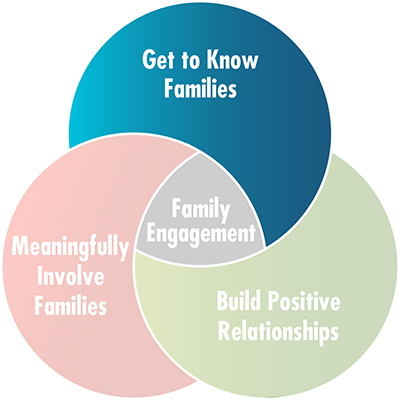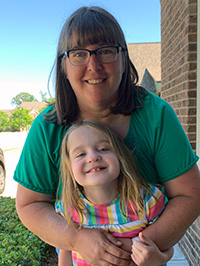What do educators need to understand about families of children with disabilities?
Page 2: Emotional Reactions to Disability
 To begin the process of getting to know families, educators must first recognize that families can experience many emotions related to having a child with a disability, and that these emotions are not fixed. They usually change over time. For example, though it is not uncommon for parents initially to experience grief or despair, these feelings often change to ones of joy and strength. Let’s look more closely at these emotional reactions and how they might fluctuate over time.
To begin the process of getting to know families, educators must first recognize that families can experience many emotions related to having a child with a disability, and that these emotions are not fixed. They usually change over time. For example, though it is not uncommon for parents initially to experience grief or despair, these feelings often change to ones of joy and strength. Let’s look more closely at these emotional reactions and how they might fluctuate over time.
Range of Emotions
 Some parents of children with disabilities might be dealing with the loss of their original hopes and dreams for their child. Similar to families who have had to deal with the loss of a loved one, the families of children with disabilities may go through the emotional states described in the table below. These states do not necessarily occur in an orderly sequence, and they can repeat themselves when a family’s child experiences—or should be experiencing—key milestones or transitions. Such parents often describe their lives as emotional roller coasters as they face the ups and downs of raising a child with a disability. Educators can help by being sensitive and by making themselves aware of how grief might play a part in the family’s experiences.
Some parents of children with disabilities might be dealing with the loss of their original hopes and dreams for their child. Similar to families who have had to deal with the loss of a loved one, the families of children with disabilities may go through the emotional states described in the table below. These states do not necessarily occur in an orderly sequence, and they can repeat themselves when a family’s child experiences—or should be experiencing—key milestones or transitions. Such parents often describe their lives as emotional roller coasters as they face the ups and downs of raising a child with a disability. Educators can help by being sensitive and by making themselves aware of how grief might play a part in the family’s experiences.
| Emotion | Examples of how the parent might display the emotion |
|---|---|
| Denial | Parent denies his or her child has a disability. |
| Anxiety | Parent goes through dramatic change that might affect his or her attitudes, values, beliefs, and routines. |
| Fear | Parent may feel concerned about letting his or her child with a disability do certain things (protective). |
| Depression | Parent may experience uncontrollable tears, sadness, and feelings of hopelessness. |
| Guilt | Parent may feel he or she is somehow to blame for the disability or the situation. |
| Anger | Parent may act out his or her anger or direct it toward another person. |
(Adapted from Childhood Disability: A Parent’s Struggle, by K. Moses, 1987, and You Are Not Alone: For Parents When They Learn Their Child has a Disability, by P. McGill Smith, 2010.)
Take a moment to listen to Luz Hernandez describe the emotions she has felt over the years as the parent of a child with a disability (time: 2:35).

Luz A. Hernandez
Parent of a young adult with a disability
Executive Director, Hispanos Unidos Para
Niños Excepcionales (HUNE)
Transcript: Luz A. Hernandez
I remember it like it was yesterday. I told the doctor that I was really concerned about him because he was seven months at the time, still really didn’t lift his head well, didn’t turn over, couldn’t sit down right. And, you know, he told me, well, all children are different, all milestones are different, but ’cause I insisted that he would get a CT Scan, “to put my mind at ease” were his exact words. Well, we did that, and about two weeks after he was authorized to get a CT Scan that’s when they broke the news to me that he had hydrocephalus. His head was 95% bigger than children his age, which was why he couldn’t really lift his head or do things. My initial reaction was I was scared. I grieved for my son. I mean, I remember driving home that day, and I literally could not drive. I had to park every other block, ’cause I was in so much tears I couldn’t see what was in front of me. But my initial reaction was I couldn’t believe it. I didn’t know what to expect. I was scared. I was scared more for him than for me. I was thinking about everything that we wanted for him and probably would not be able to have for him. He was operated on at eight months of age. When the neurosurgeon operated, they told me, oh, he’d be able to lead a perfectly normal life because the operation was successful and it didn’t affect his brain. But that unfortunately was not the case. We kind of, throughout the years, we hoped he would talk. We hoped he would walk. He finally walked when he was about five-and-a-half years of age. He still uses diapers. He doesn’t speak. He’s severely disabled. About nine years of age, he started having seizures. So I think his whole life, we’ve been kind of adapting, hoping and praying for the best, preparing ourselves for the worst. Andy is a great kid. He will always have a smile for you on his face. But his life has really gotten complicated, his medical issues. This weekend, for example, I was in a confirmation for my older daughter, my twelve-year-old. I realize how Andy will never do this, you know, follow the steps that we were taught to believe as being a part of our normal life. It’s kind of a grievance process. You know, his life is not as complicated to him as it is to us. Through the years, we just have learned to adapt, and it hasn’t always been easy, during special occasions, but we move forward.
 Just as the families of children with disabilities might experience anxiety or grief, so too might they experience and express feelings of strength, hope, joy, love, and pride. In fact, many families find that their child with a disability has positively impacted their lives by:
Just as the families of children with disabilities might experience anxiety or grief, so too might they experience and express feelings of strength, hope, joy, love, and pride. In fact, many families find that their child with a disability has positively impacted their lives by:
- Increasing their ability to love and to accept differences
- Strengthening their family ties
- Giving them a greater sense of pride in their child’s accomplishments
- Leading them to learn more about disabilities and advocacy roles
- Making them more patient, understanding, and tolerant
- Teaching them to enjoy the little things in life
Listen to Aubri Girardeau describe the joy her child has brought to her family (time: 0:50).

Aubri Girardeau
Mother of a child with autism
and specific learning disabilities
Transcript: Aubri Girardeau
I cannot imagine our life without this child. She is pure joy. She is hilarious. She’s quirky in all the most wonderful ways. You’re going to laugh if you’re around her. And she’s just kind of readjusted my focus away from success being determined by academic success or athletic prowess. Now I realize just being a joy bringer is successful.
She just helps us understand that you can find joy in the small moments, and the accomplishments that other people take for granted, we never do. And we’re just so proud of her for being exactly who she is. She has changed our lives in the most wonderful ways. Obviously, there have been a lot of challenges and struggles, but overall we could not imagine our daughter any different than she is, exactly as she is.
Supporting Families
It is important for educators to understand that families of children with disabilities are likely to experience a wide range of sometimes contradictory emotions, and that one of their most important roles is to be supportive. They can do this by:
- Accepting families
- Understanding that each family is unique in how they deal with their child’s disability
- Building on the strengths of the family
Activity
One way for educators to support families is to try to understand what it would be like to raise a child with a disability. Imagine yourself as the parent in one of the three scenarios below:
- Your eight-year-old child was recently evaluated for a learning disability. This is your first child and you had no anxiety about his development until his new third-grade teacher voiced her concern about his difficulty with reading. Soon the results of the evaluation come back, and you are informed that your child has a learning disability in reading. In addition, the school states that it would like to evaluate him further for attention deficit disorder.
- Your 14-year-old daughter was recently involved in a car accident where she sustained serious injuries. She is your oldest of three children, who just made the high school basketball team. While in the hospital she is diagnosed with a traumatic brain injury (TBI). You are told that this condition will likely affect her mobility skills, speech, and, possibly, cognitive abilities.
- Recently, your two-year-old son has frequent tantrums when he needs help. You and your spouse write it off as “the terrible two’s.” You then notice that he shows very little interest in interacting with the family and only wants to play with the same toy cars. You share this information with the pediatrician during a regularly scheduled visit. The doctor conducts a screening for autism spectrum disorder (ASD), and based on the results decides to conduct a full evaluation. After subsequent visits with specialists, your fears are confirmed that your son has autism.
Select one of the scenarios above and reflect on the following questions:
- What do you think your immediate reaction would be?
- How do you think your friends and family would respond when you told them the news?
- How do you think your life might change?
- Do you think your dreams for your child would change after learning of the disability? Explain.
- What support would you want from educators for you and your child?